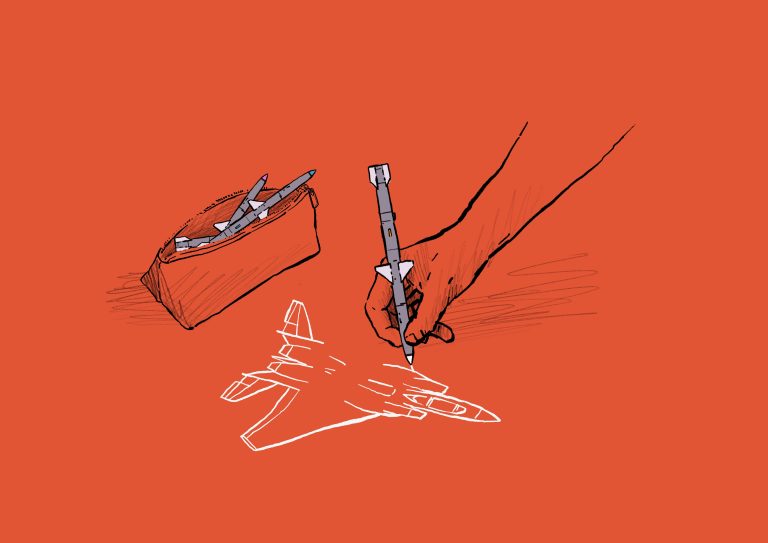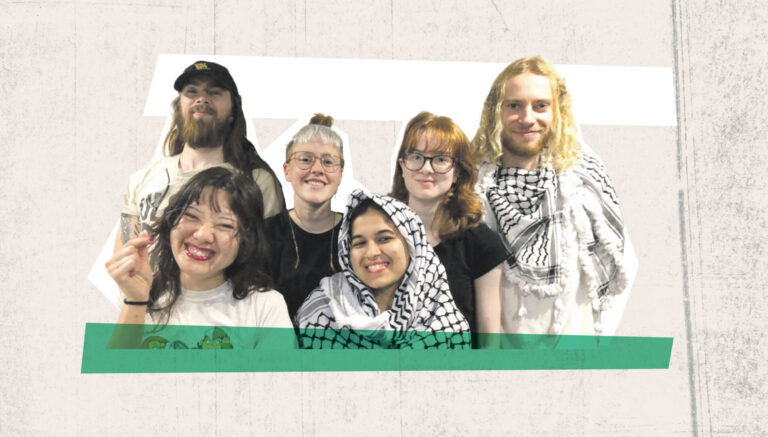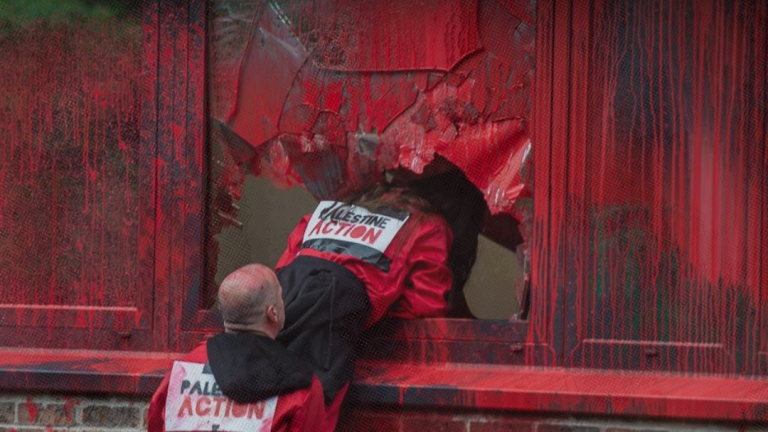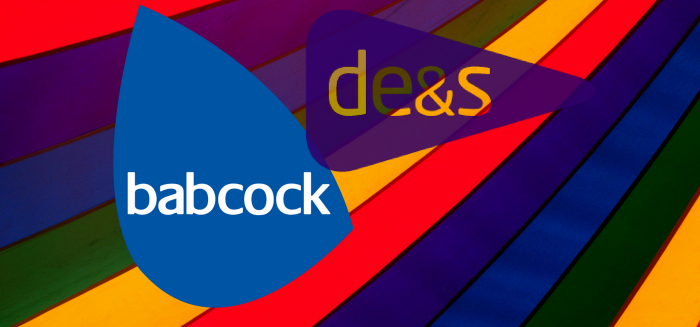University of Bristol’s partnerships with arms companies back in the spotlight
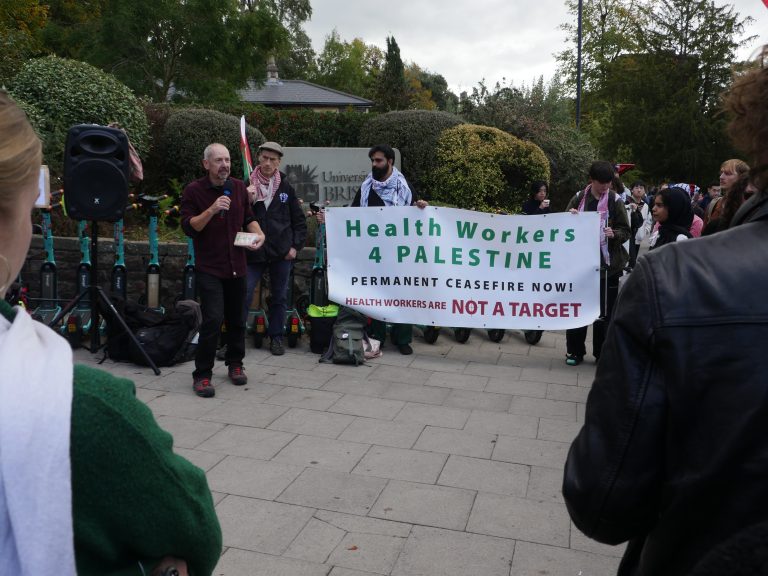
In late September, around 70 students and staff gathered for a rally outside Senate House, at the University of Bristol, calling on the institution to cut its ties with arms companies.
Protestors waved Palestinian flags, while chants of “Free Palestine” echoed off nearby buildings. Students called for the university to “Grow a backbone!” and “Learn some empathy and decolonise your brain!”
The rally is the latest in a long-running campaign against the university’s links to the arms industry.
According to Demilitarise Education, which monitors the UK higher education sector’s financial ties to arms companies, the university has partnerships worth over £85 million with some of the world’s largest arms firms, including Airbus, BAE Systems, Thales and Raytheon.
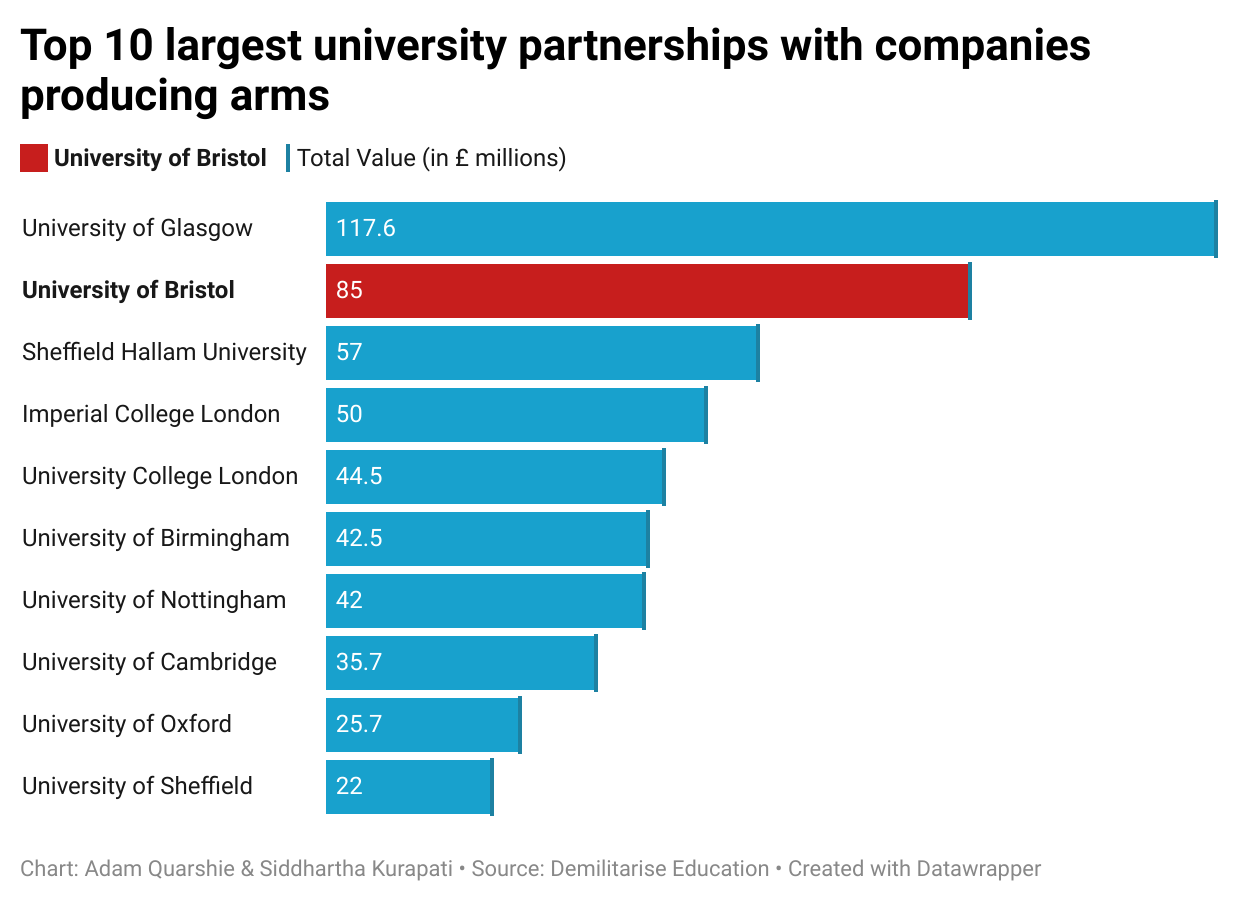
For the past two years, Israel’s bombardment of Gaza has killed tens of thousands of civilians and devastated its housing, health and education infrastructure.
The United Nations, and human rights organisations such as Amnesty International and B’Tselem, have concluded Israel’s assault meets the definition of genocide. Estimates of Palestinian deaths start at 65,000, though the number is likely far higher. Even Israel’s own data shows that the vast majority of people killed in Gaza have been civilians.
In Bristol, activists have targeted local arms sites, including Elbit Systems in Patchway and insurer Allianz, which provides cover for Elbit.
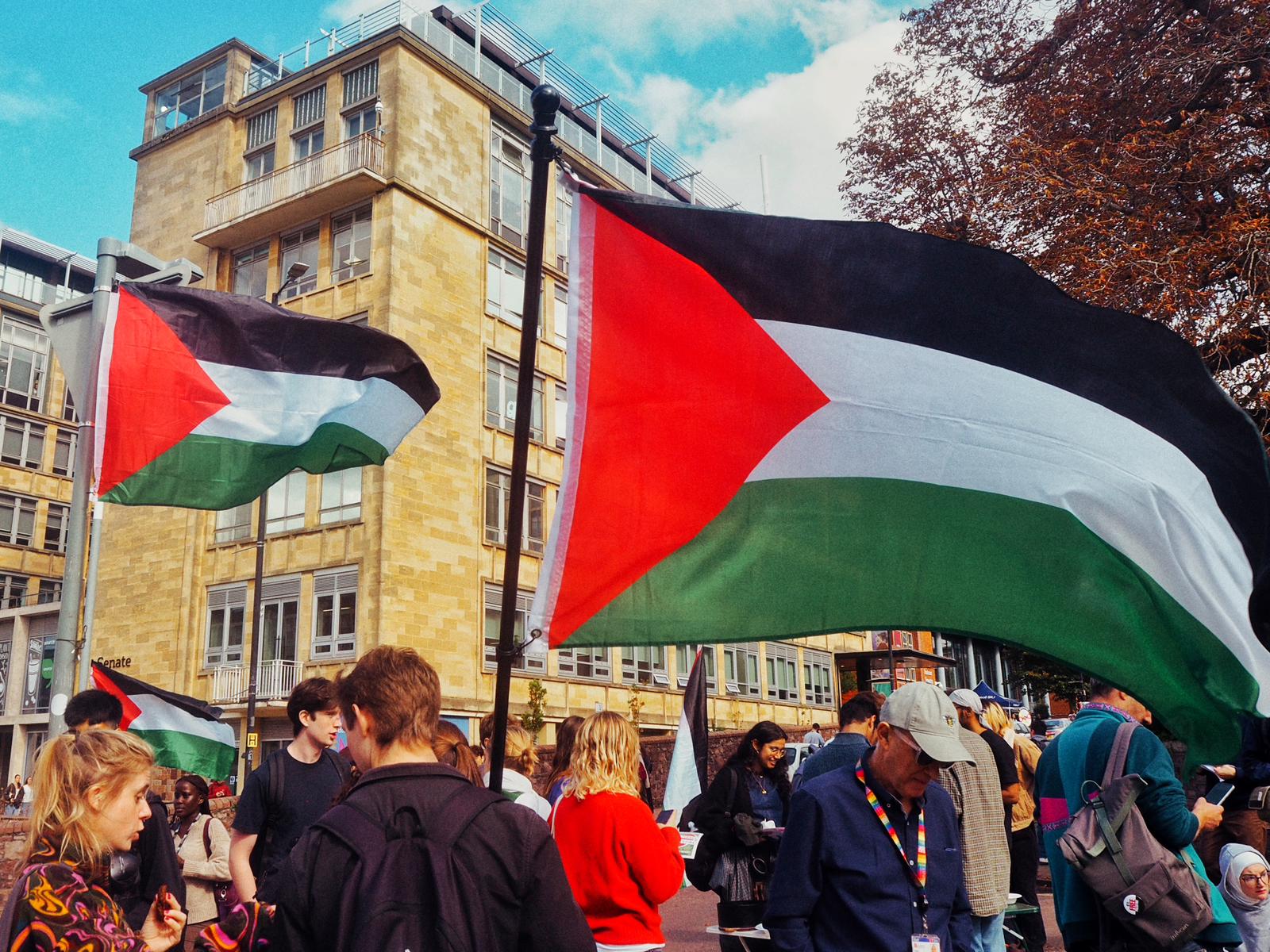
Students and campaigners argue that by maintaining partnerships with arms companies, some of which are producing the weapons used against civilians in Gaza — the University of Bristol is complicit in genocide.
But what do these partnerships actually look like? What would disinvestment mean in practice, and how is the university responding to the growing pressure?
‘They need to take a stance’
I ask Rainbow, a student organiser wrapped in a keffiyeh, and one of the rally speakers, what the students are demanding from the university. “It’s clear”, she says. “Divest. Cut ties with arms companies. Step two is to recognise the injustices they’ve done and give scholarships to Palestinian students.”
Felix, a former student involved in Palestine solidarity activism, adds that the university’s responsibilities should go further. “They have ties with Israeli universities, Israeli research projects. Any kind of knowledge or money that can be used in fueling this genocide — they need to take a stance and put an end to it.”
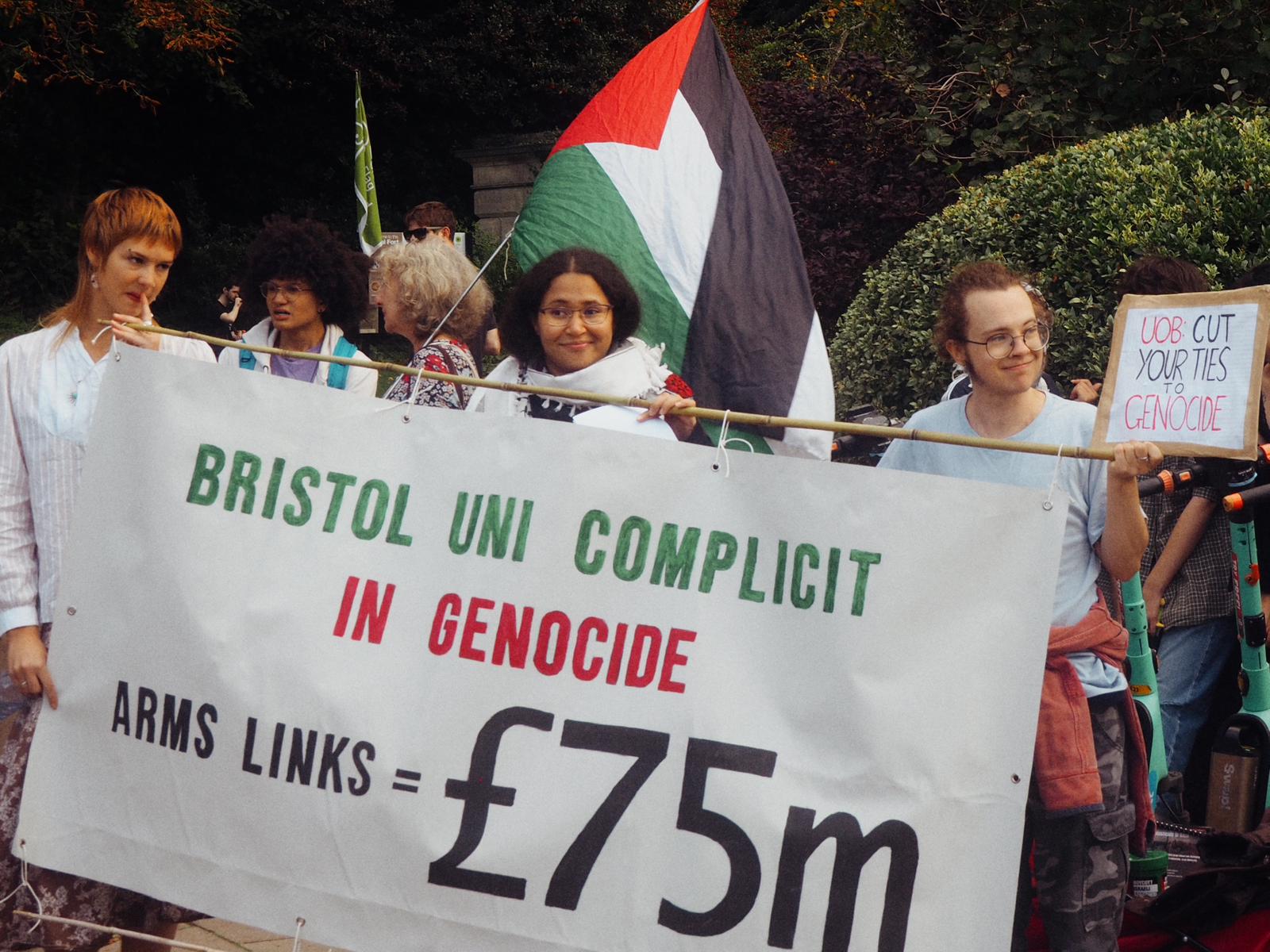
The protest followed revelations about the university’s arms trade links. The Demilitarise Education database, built from FOI requests submitted between 2021 and 2024, shows Bristol has ties with 57 arms companies, including Airbus, Thales, BAE Systems, and Rolls-Royce.
There are 42 active research partnerships and 33 academic partnerships, often involving apprenticeships or graduate schemes. One research partnership is with BAE Systems, a partner in manufacturing F-35 fighter jets. The UK has delivered 45 of these to Israel since 2016.
Though the UK government issued a ban on export licenses to Israel in September 2024, components can still be supplied indirectly via third countries, primarily the US.
In response, students are demanding restitution. “In 200 years, Bristol University will say, ‘We’re in a reparative justice program for Palestinians’,” Rainbow says, referring to the university’s Reparative Justice Programme, introduced in 2024 to address historic ties to the trade in enslaved people. “We’re complicit in arms that are killing Palestinians right now.”
Students also criticised careers events featuring defence companies, particularly targeting engineering students.
This week (16 October), Boston Consulting Group advertised a careers event at the University. Though not an arms company, two partners in the firm were involved in creating the Gaza Humanitarian Foundation, whose US-backed Israeli forces and private contractors have killed close to a thousand Palestinians while they queued for aid so far this year.
The former partners from BCG involved in GHF have since been fired from their roles.
What partnerships look like in practice
According to campaign group Bristol Against the Arms Trade, the city has “one of the largest defence and aerospace sectors in Europe,” given the presence of major arms firms and the Ministry of Defence’s Defence Equipment and Support (DE&S) site in Abbey Wood, which manages defence contracts for the UK Armed Forces.
The outsized presence of the arms industry in Bristol creates lucrative partnership opportunities. But it can be hard to differentiate between civil and military applications of these companies’ products.
Many of the University of Bristol’s partnerships appear to have civil applications. For example, a research partnership with BAE Systems and Airbus proposes to explore “experimental flight dynamics testing for highly flexible aircraft”.
Other links come through academic partnerships, with companies such as the Royal Air Force, the Atomic Weapons Establishment and BAE Systems offering apprenticeships or graduate schemes.
These arrangements do not involve direct investment into the university, according to the Demilitarise Education database.
There’s a reason these companies are both arms companies and civil aerospace companies. There’s a big overlap between them
Tom*, PhD student
A University of Bristol webpage outlining its work with the defence sector states:
“Where we do have relationships with organisations operating in the defence sector, our work is either related to their civil sectors or some other socially beneficial purpose. For example, work to prevent the proliferation of weapons of mass destruction.
“We do not facilitate the sale or manufacture of conventional weapons and armaments to military regimes.
“However, we recognise that certain research areas have the potential for ‘dual use’ in defence applications. For example, digital technology domains such as artificial intelligence and cyber security.”
‘Engineer for a better world, not a battlefield’
Students argue that seemingly benign research projects can often serve military ends.
“There’s a reason these companies are both arms companies and civil aerospace companies, right? There’s a big overlap between them,” says Tom* a PhD engineering student.
He points to a past collaboration with Thales, the French arms company, developing drones for search and rescue missions. “On the face of it, that sounds great,” he says, “but it’s not a far reach from a search-and-rescue drone to a hunt-and-destroy or surveillance drone.”
Drones produced by firms such as Elbit, Airbus and Thales are increasingly used to militarise borders around the Mediterranean.
In response to the student’s concerns, a University of Bristol spokesperson said: “We respect our students’ freedom of speech, and our Vice-Chancellor is always happy to meet with students to hear their concerns.
“The University’s association with a wide variety of organisations helps drive innovative research and improves our students’ future careers. All our partnerships undergo stringent diligence checks and ethical reviews.”
But for many student activists, this doesn’t go far enough.
“Obviously, we’ve got a very anti-arms company angle,” says Felix. “But we’d also want the university to divest from anything like oil companies, non-renewables, anything that risks the health and safety of people and the planet.” He adds that disinvestment should be accompanied by a public statement from the University.
For Rainbow, disinvestment would involve a reallocation of the university’s resources. “Aerospace engineering is so important to finding a solution to the climate crisis right now”, she says.
“We always say: ‘engineer for a better world, not a battlefield’”.
*Names have been changed.
Independent. Investigative. Indispensable.
Investigative journalism strengthens democracy – it’s a necessity, not a luxury.
The Cable is Bristol’s independent, investigative newsroom. Owned and steered by more than 2,600 members, we produce award-winning journalism that digs deep into what’s happening in Bristol.
We are on a mission to become sustainable, and to do that we need more members. Will you help us get there?
Join the Cable today


